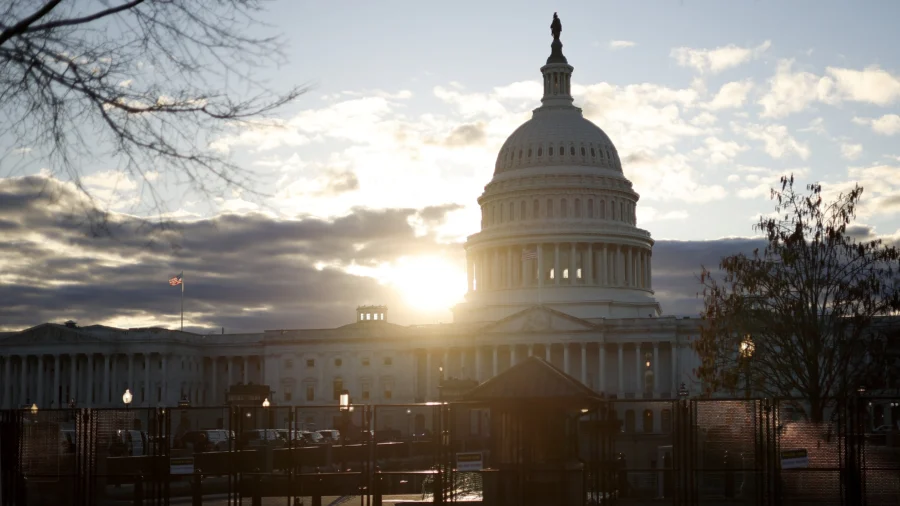The Senate passed six government funding bills on March 8 to avoid an impending shutdown deadline that was poised to activate at midnight later that night.
Senators approved the funding package 75–22 early in the evening on March 8 after hours of debate. Democrats pushed for a faster vote, while Republicans proposed several amendments to the funding package that all inevitably failed.
After the House of Representatives passed its measure on March 6, only the Senate was left to pass its funding bills before they were all sent to President Joe Biden to be signed into law. In addition to the March 8 deadline, there is another looming shutdown deadline on March 22.
The bills passed by Democrats and Republicans, including a second set of bills ahead of the March 22 deadline, will get Congress one step closer to funding vital government programs for the remainder of the fiscal year.
The spending package funds programs including the departments of Veterans Affairs, Energy, Agriculture, Transportation, Commerce, Justice, Interior, military construction, the Food and Drug Administration (FDA), Housing and Urban Development, and other federal programs.
The package was touted by both Republicans and Democrats.
The Senate bills would also provide critical support for veteran medical care, hiring new air traffic controllers, and scientific research programs for the United States’ economic competitiveness with China.
“This is an outcome both parties can be proud of because we have found a way to put the needs of our country first,” said Senate Majority Leader Chuck Schumer (D-N.Y.) on the Senate floor on March 8.
“Today’s bipartisan agreement gives us momentum and space to finish the remaining appropriation bills by March 22. Of course, it’s going to take both sides working together to keep that momentum alive,” he added.
“To folks who worry that divided government means nothing ever gets done, this bipartisan package says otherwise.”
House Bill
House Republicans under Speaker Mike Johnson’s (R-La.) leadership passed the House funding package on March 7 with bipartisan support from Democrats. The final vote was 339–85, which included two Democrats and 83 Republicans voting in opposition to the spending bills.
That 1,050-page package of bills from the House funds the same list of departments and government programs as the Senate version.
However, it also reduces funding for several programs, which Mr. Johnson referred to as “sharp cuts to agencies and programs critical to President Biden’s agenda” in a news release on March 3.
Those include 10 percent spending reductions for the Environmental Protection Agency, a 6 percent reduction for the FBI, and a 7 percent reduction for the Bureau of Alcohol, Tobacco, Firearms, and Explosives.
The bills also include provisions intended to restrain agencies the GOP claims are weaponized against Republicans.
“This legislation forbids the Department of Justice from targeting parents exercising their right to free speech before school boards, while it blocks the Biden administration from stripping Second Amendment rights from veterans,” Mr. Johnson said on March 3.
Since many Republicans wanted to do away with funding the government via large omnibus bills, the House Freedom Caucus pushed other GOP members to oppose the package.
“The House Freedom Caucus opposes the $1.65 trillion omnibus spending bill, which will be decided in two halves, the first being brought to the floor this week under suspension of the rules,” the group said in a March 5 statement.
“Even in the face of $34 trillion in national debt, the omnibus will bust the bipartisan spending caps signed into law less than a year ago and is loaded with hundreds of pages of earmarks worth billions.”
Despite the opposition from some Republicans, the passage of these funding bills marks a rare show of bipartisanship in Congress during a contentious primary and general election season.
Samantha Flom contributed to this report.
From The Epoch Times

